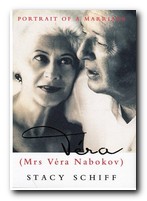a biography of the ultimate amanuensis
Russian literature is rich in examples of famous writers whose wives have acted as unpaid secretaries and copyists. Leo Tolstoy, Fyodor Dostoyevski, and (I suspect) Alexander Solzhenistyn. But Vera Slonim, who married Vladimir Nabokov, took the tradition to unprecedented extremes. They met as Russian exiles in Berlin in 1923 – both dispossessed of fortunes – and she gave up the rest of her life to acting as Nabokov’s secretary, typist, business manager, translator, research assistant, chauffeur, and even standing in for him as a lecturer. Vera: Mrs Vladimir Nabokov is a biography of the wife, but it tells us a lot about the husband too.
 His output as a writer was large – but as an author still given to writing in pencil on small index cards, then handing them over to her to copytype on an old portable, it’s inconceivable that he would have produced half as much without her self-sacrifice. And it’s a sacrifice she was very willing to make. She promoted and protected his literary reputation throughout his life – and after his death. She did this at the expense of losing friends and making enemies of family alike.
His output as a writer was large – but as an author still given to writing in pencil on small index cards, then handing them over to her to copytype on an old portable, it’s inconceivable that he would have produced half as much without her self-sacrifice. And it’s a sacrifice she was very willing to make. She promoted and protected his literary reputation throughout his life – and after his death. She did this at the expense of losing friends and making enemies of family alike.
In fact the portrait Stacy Schiff creates is of a clever, proud, but ultimately rather cold and brittle woman who nursed grudges and ‘spoke her mind’ in a way which seemed to be a cover for rudeness and cruelty. If there’s a weakness in her approach as a biographer it’s that she often takes the evidence she gathered from the Nabokovs themselves at face value. She also assumes that scenes from Nabokov’s novels are accurate transcriptions of not only his own life, but even his wife’s life before they met. Both of these are serious methodological weakness.
However, given the unalloyed marital rapture in which they both claimed to live, I was glad to see that she did not skate over Nabokov’s seriously disturbing love-affair with Irina Guadanini – the one event which threatened the idyllic nature of the relationship. Yet in the course of tracing its dramatic denouement she casually reveals several earlier affairs – none of which she had mentioned at all. This is almost like applying the rules of fiction to the genre of biography, where they do not belong.
The big narrative is one of permanent exile – first from Russia to Berlin (the first centre of exile) then to Paris (the second) and finally to the USA, before the world fame of Lolita allowed them to return to Europe. It was eventually for tax reasons that they settled at the Montreux Palace Hotel. They needed a fixed address from which expenses could be claimed.
Throughout this Odyssey, Vera is depicted as a woman who is aristocratic in spirit (though not in fact) who was prepared to sacrifice herself entirely to the needs of her husband – even to the extent of protecting his social reputation when evidence of his sexual peccadilloes and predilections surfaced when teaching young women at Wellsley College. “He liked young girls. Not just little girls” observed one of his dalliances. Vera ended up sitting in on all his lectures, just to keep an eye on him.
She comes across as a curious mixture of hauteur and self-abasement, a Jewish immigrant who nevertheless supported McCarthy in the 1950’s show trials, and a rabid anti-communist who carried a gun in her handbag.
They were a tight-knit double act, who eventually hid behind each other. She wrote letters in his name and on his behalf. He replied to letters in a similar vein – pretending to be her. They had a joint dairy, and they edited their past to present each other in the best possible light. When discrepancies were brought to light, they simply denied them.
Lolita was the turning point in their lives. Nabokov gave up his teaching job, and they became financially comfortable for the first time in their adult lives. And yet in another sense, nothing changed at all. Vera carried on being his full time personal assistant, translating him to the world, and he carried on writing. When he wasn’t producing new novels, he was translating his back catalogue into English and other languages with the help of his wife and his son.
Nabokov was well known for his magisterial pronouncements and his seeming incapacity for the slightest self-doubt. But anyone who has read his work and pronouncements carefully will know that he was given to misleading his readers and omitting the truth (a characteristic Vera shared). In his introduction to Lolita he claims that the first idea for the novel came to him on seeing the painting of a chimpanzee in the Jardin des plantes – when in fact he had already written an entire novella on exactly the same theme in 1939 – The Enchanter. Once again it seems we should ‘trust the tale, not the teller.’
© Roy Johnson 2002
Stacy Schiff, Vera: Mrs Vladimir Nabokov, London: Macmillan, 1999, pp.456, ISBN: 0330376748
More on Vladimir Nabokov
More on literary studies
Nabokov’s Complete Short Stories